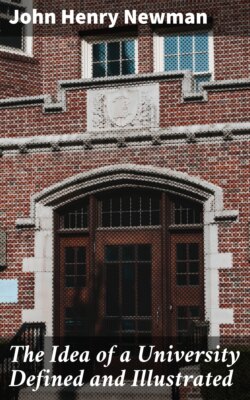Читать книгу The Idea of a University Defined and Illustrated - John Henry Newman - Страница 27
На сайте Литреса книга снята с продажи.
3.
ОглавлениеTable of Contents
Let us take, for instance, man himself as our object of contemplation; then at once we shall find we can view [pg 048] him in a variety of relations; and according to those relations are the sciences of which he is the subject-matter, and according to our acquaintance with them is our possession of a true knowledge of him. We may view him in relation to the material elements of his body, or to his mental constitution, or to his household and family, or to the community in which he lives, or to the Being who made him; and in consequence we treat of him respectively as physiologists, or as moral philosophers, or as writers of economics, or of politics, or as theologians. When we think of him in all these relations together, or as the subject at once of all the sciences I have named, then we may be said to reach unto and rest in the idea of man as an object or external fact, similar to that which the eye takes of his outward form. On the other hand, according as we are only physiologists, or only politicians, or only moralists, so is our idea of man more or less unreal; we do not take in the whole of him, and the defect is greater or less, in proportion as the relation is, or is not, important, which is omitted, whether his relation to God, or to his king, or to his children, or to his own component parts. And if there be one relation, about which we know nothing at all except that it exists, then is our knowledge of him, confessedly and to our own consciousness, deficient and partial, and that, I repeat, in proportion to the importance of the relation.
That therefore is true of sciences in general which we are apt to think applies only to pure mathematics, though to pure mathematics it applies especially, viz., that they cannot be considered as simple representations or informants of things as they are. We are accustomed to say, and say truly, that the conclusions of pure mathematics are applied, corrected, and adapted, by mixed; but so too the conclusions of Anatomy, Chemistry, [pg 049] Dynamics, and other sciences, are revised and completed by each other. Those several conclusions do not represent whole and substantive things, but views, true, so far as they go; and in order to ascertain how far they do go, that is, how far they correspond to the object to which they belong, we must compare them with the views taken out of that object by other sciences. Did we proceed upon the abstract theory of forces, we should assign a much more ample range to a projectile than in fact the resistance of the air allows it to accomplish. Let, however, that resistance be made the subject of scientific analysis, and then we shall have a new science, assisting, and to a certain point completing, for the benefit of questions of fact, the science of projection. On the other hand, the science of projection itself, considered as belonging to the forces it contemplates, is not more perfect, as such, by this supplementary investigation. And in like manner, as regards the whole circle of sciences, one corrects another for purposes of fact, and one without the other cannot dogmatize, except hypothetically and upon its own abstract principles. For instance, the Newtonian philosophy requires the admission of certain metaphysical postulates, if it is to be more than a theory or an hypothesis; as, for instance, that what happened yesterday will happen to-morrow; that there is such a thing as matter, that our senses are trustworthy, that there is a logic of induction, and so on. Now to Newton metaphysicians grant all that he asks; but, if so be, they may not prove equally accommodating to another who asks something else, and then all his most logical conclusions in the science of physics would remain hopelessly on the stocks, though finished, and never could be launched into the sphere of fact.
Again, did I know nothing about the movement of [pg 050] bodies, except what the theory of gravitation supplies, were I simply absorbed in that theory so as to make it measure all motion on earth and in the sky, I should indeed come to many right conclusions, I should hit off many important facts, ascertain many existing relations, and correct many popular errors: I should scout and ridicule with great success the old notion, that light bodies flew up and heavy bodies fell down; but I should go on with equal confidence to deny the phenomenon of capillary attraction. Here I should be wrong, but only because I carried out my science irrespectively of other sciences. In like manner, did I simply give myself to the investigation of the external action of body upon body, I might scoff at the very idea of chemical affinities and combinations, and reject it as simply unintelligible. Were I a mere chemist, I should deny the influence of mind upon bodily health; and so on, as regards the devotees of any science, or family of sciences, to the exclusion of others; they necessarily become bigots and quacks, scorning all principles and reported facts which do not belong to their own pursuit, and thinking to effect everything without aid from any other quarter. Thus, before now, chemistry has been substituted for medicine; and again, political economy, or intellectual enlightenment, or the reading of the Scriptures, has been cried up as a panacea against vice, malevolence, and misery.
